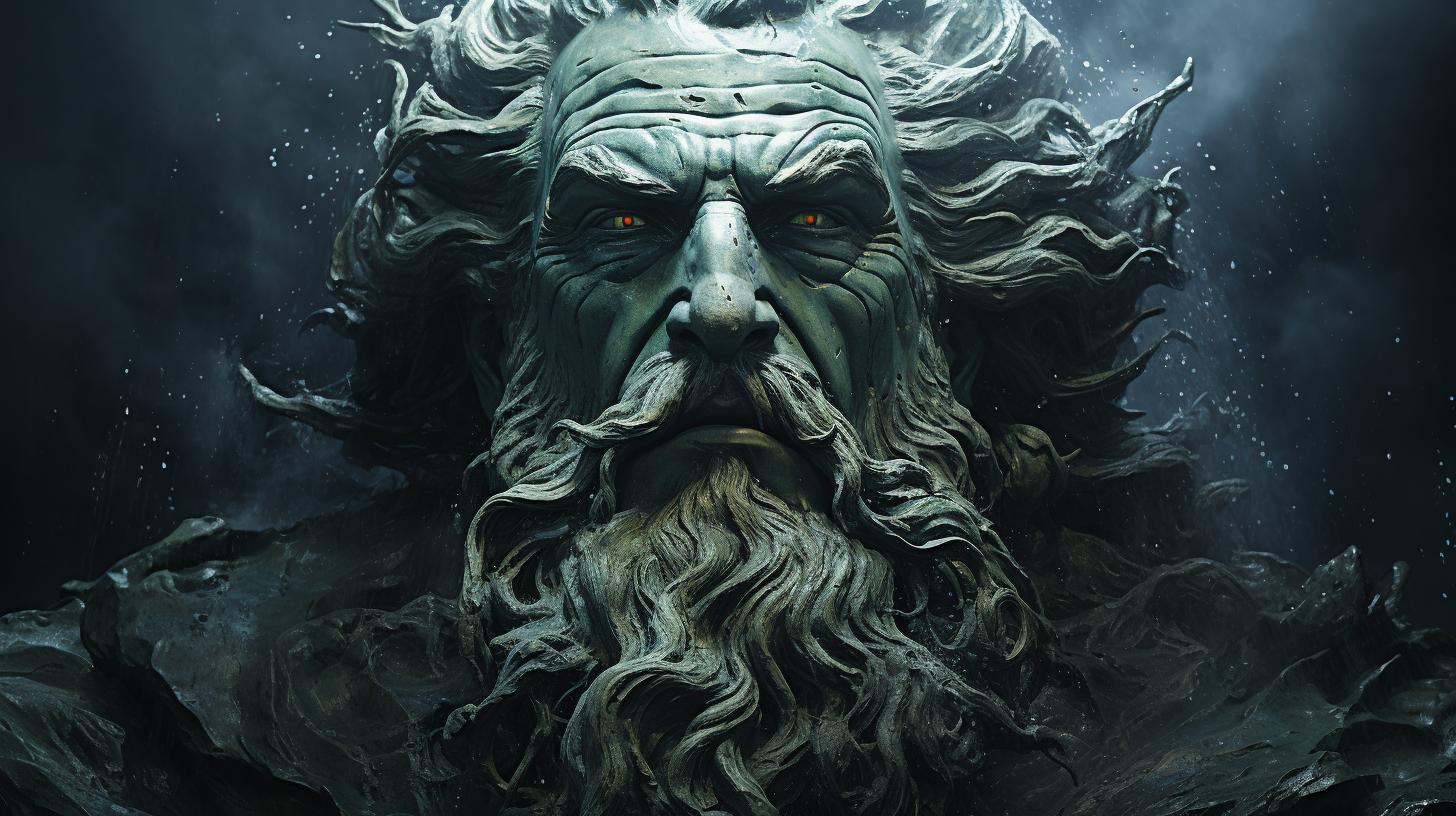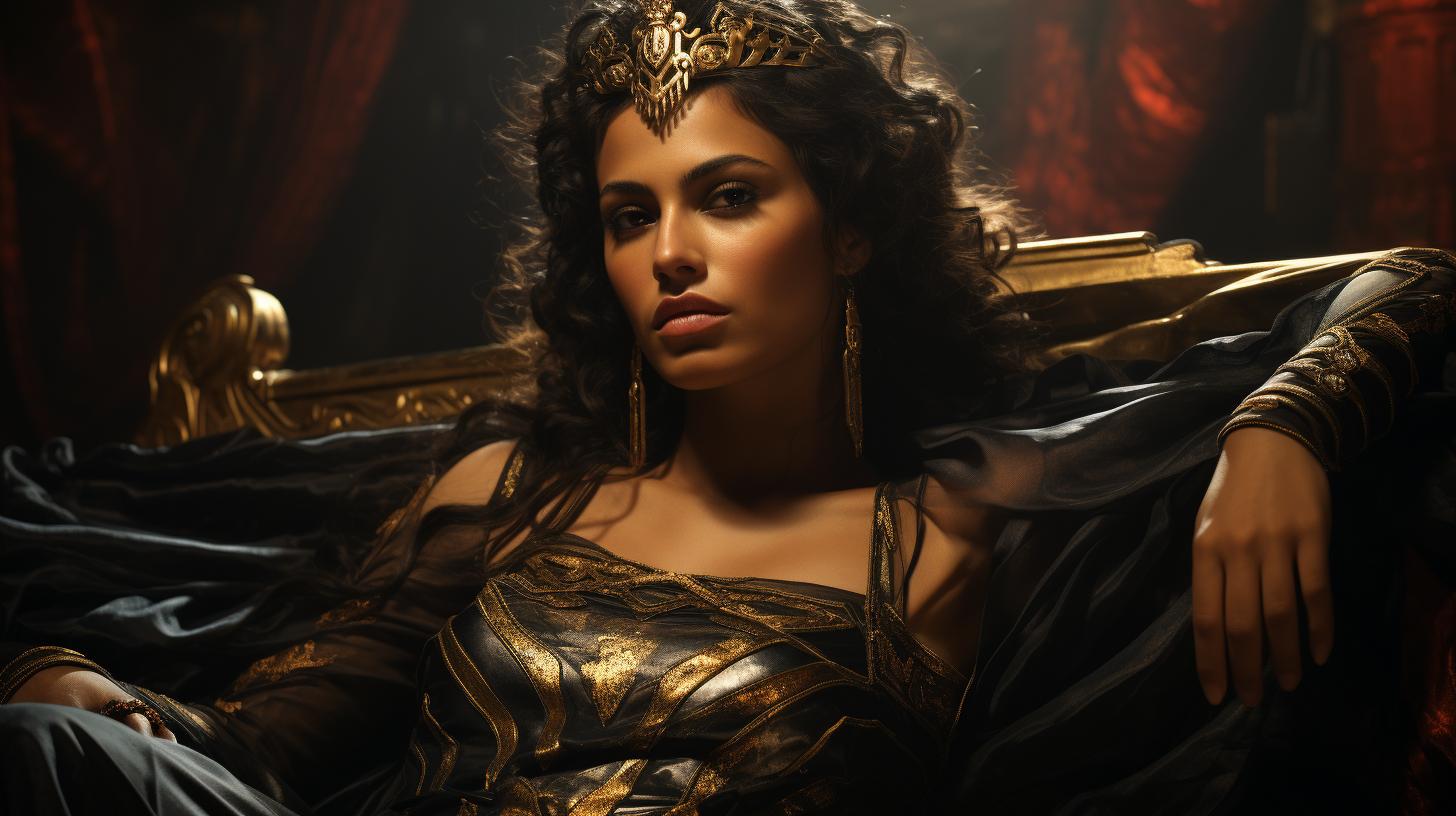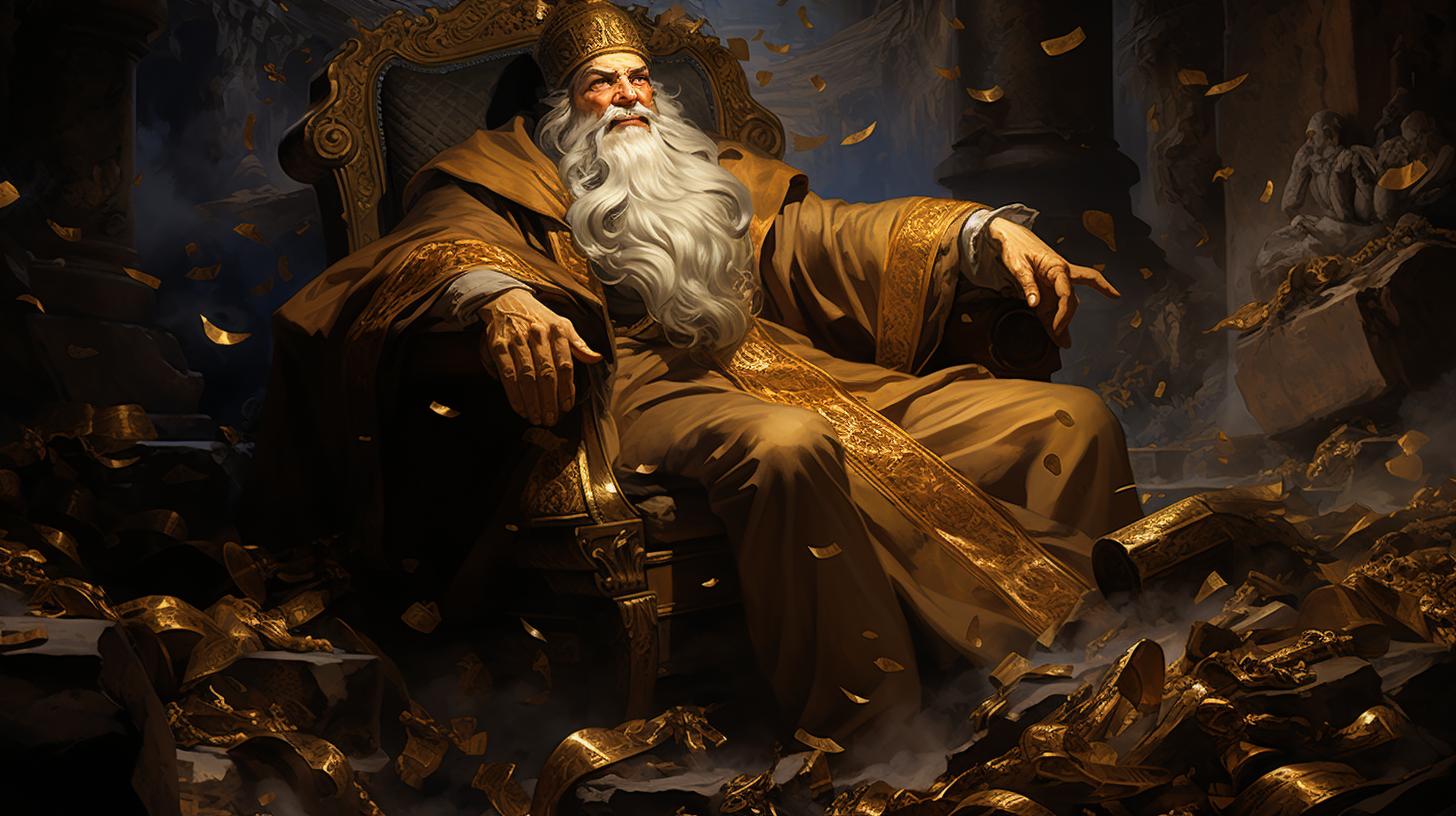Unveiling the Enigmatic Power of Proteus in Greek Mythology

Proteus, a deity in Greek mythology, was known as the god of the sea and bodies of water. He represented the ever-changing nature of water and possessed the ability to foresee the future.
This article explores various aspects of Proteus’ legend, including his origins, role as a seafaring prophet, and connection to other gods like Poseidon. Additionally, it delves into Proteus Syndrome, a medical condition named after the deity.
The article also discusses the relevance of Proteus’ story for modern educators and the significance of his symbolism of adaptability and transformation.
1. Proteus in Greek Mythology
Proteus, a fascinating figure in Greek mythology, embodies the enigmatic and ever-changing nature of the sea. Exploring the origins of Proteus sheds light on the rich tapestry of this deity’s existence.
The Origins of Proteus
The lineage of Proteus traces back to the gods, with conflicting accounts of his parentage. While some believe him to be the son of Poseidon, others claim he arose from the sea itself.
These conflicting narratives only deepen the intrigue surrounding Proteus.
Proteus: The God of the Sea
Proteus stands as the embodiment of the sea, revered as the god governing its vast realms. His influence extends beyond the physical domain, encompassing the emotional and transformative aspects associated with water.
Proteus: The Master of Change and Adaptation
Possessing a remarkable ability to change form at will, Proteus exemplifies adaptability and fluidity. He represents the ebb and flow of life, reminding us of the imperative to embrace change and navigate its unpredictable currents.
Proteus’ Prophecy: Insights into the Future
Proteus’s gift of prophecy provided mortals with guidance and foreknowledge. His ability to divine and illuminate the future lends an aura of mystery and reverence to this god of the sea.
Prometheus: A Greek God Comparison
Explore the fascinating parallels between Proteus and Prometheus, two prominent figures in Greek mythology. This section delves into the potential connections and similarities between these deities and their roles in ancient Greek tales.
Prometheus and Proteus: A Connection?
Uncover the intriguing question of whether there are any significant links between Prometheus and Proteus. While their mythological narratives differ, this subsection explores potential shared traits or influences that connect these two figures.
Prometheus: The Titan Who Stole Fire
Delve into the captivating tale of Prometheus, the Titan who defied the gods by stealing fire and gifting it to humanity. Learn about the consequences of this daring act and the impact it had on both mortals and the divine realm.
Prometheus’ Punishment and Redemption
Discover the dramatic punishment inflicted upon Prometheus for his audacity. This subsection examines the mythological accounts of his torment, including the eternal suffering endured as a result of his defiance.
Explore the potential paths to redemption that exist within Prometheus’ story and the lessons they convey.
Unveiling the Prometheus Myth
Unveiling the Prometheus Myth delves into the captivating tale of Prometheus and explores its significance in Greek mythology. This section examines various aspects of Prometheus’ story, shedding light on his birth and early life as a Titan.
It also focuses on his pivotal role in the creation of mankind, where he defied the gods by gifting humans with fire and bestowing upon them the power of knowledge.
The Birth and Early Life of Prometheus
In this section, we unravel the mysterious origins of Prometheus, delving into his unique parentage as a son of the Titan Iapetus. We explore his upbringing and early life, tracing his early interactions with the deities and the path that ultimately led him to become a benevolent benefactor of humanity.
Prometheus and the Creation of Mankind
Here, we delve into the pivotal role Prometheus played in the creation of mankind. We explore the tale of how he molded humanity from clay and brought them to life, as well as his bold act of stealing fire from the gods and sharing it with humans.
This act of rebellion incited the wrath of Zeus and set in motion a series of events that would forever shape Prometheus’ destiny.
Prometheus and the Trojan War
In this section, we examine Prometheus’ involvement in the legendary Trojan War.
We unveil the lesser-known connections between Prometheus and the epic conflict, exploring his interactions with key figures such as Achilles, Hector, and the gods involved in the war.
We unravel the role Prometheus played in influencing the outcome of the conflict and its aftermath.
The Mythological Achievements of Prometheus
Here, we explore the enduring legacy of Prometheus in Greek mythology. We delve into his notable accomplishments, including his role as a patron of civilization and his contributions to various fields such as agriculture, astronomy, and medicine.
We also examine his enduring punishment and the lessons his story offers about the consequences of challenging divine authority.
Exploring Proteus Syndrome
Proteus Syndrome is a rare genetic disorder that presents a myriad of physical and physiological abnormalities. This section delves into the complexities of Proteus Syndrome by examining its causes and symptoms, exploring its historical background, investigating medical advances in its treatment, and revealing personal stories of individuals living with this condition.
Understanding Proteus Syndrome: Causes and Symptoms
Proteus Syndrome is characterized by specific genetic mutations that occur early in fetal development. These mutations lead to abnormal growth and asymmetrical overgrowth of various tissues in the affected individual’s body.
Symptoms can include overgrowth of bones and connective tissue, vascular malformations, skin abnormalities, and neurological issues. Understanding the underlying causes and symptoms of Proteus Syndrome is essential for accurate diagnosis and management of the condition.
Historical Background of Proteus Syndrome
The historical background of Proteus Syndrome dates back to its first significant medical description in the late 19th century. This section explores the early accounts and scientific advancements that contributed to our understanding of this unique disorder.
Examining the historical context provides valuable insights into the progression of knowledge surrounding Proteus Syndrome and the challenges faced by early researchers.
Medical Advances in the Treatment of Proteus Syndrome
Advancements in medical knowledge and technology have significantly impacted the treatment options available for individuals with Proteus Syndrome.
This section highlights the latest breakthroughs in managing the symptoms and complications associated with the condition. From surgical interventions to pharmacological therapies, medical advancements offer hope and improved quality of life for those affected by Proteus Syndrome.
Case Studies and Personal Stories of Living with Proteus Syndrome
Personal stories and case studies provide an intimate understanding of the lived experiences of individuals with Proteus Syndrome. This section delves into the challenges and triumphs faced by those affected, offering a glimpse into their daily lives, aspirations, and resilience.
These stories shed light on the importance of support, advocacy, and raising awareness about Proteus Syndrome within the wider community.
By exploring the causes, symptoms, historical background, medical advancements, and personal experiences associated with Proteus Syndrome, we gain a comprehensive understanding of this rare genetic disorder.
This knowledge fosters compassion, empathy, and a commitment to further research and support for those affected by Proteus Syndrome in our ever-evolving medical landscape.
The Influence of Poseidon on Proteus
Throughout Greek mythology, Poseidon played a significant role in shaping the life and experiences of Proteus.
This section delves into their relationship, highlighting Proteus’ role as a seafaring prophet and the immense power that Poseidon held over the sea.
The Relationship between Proteus and Poseidon
Proteus, known as the god of the sea, was closely associated with Poseidon, the ruler of the oceans.
Poseidon held dominion over all water bodies, including the ever-changing sea that Proteus embodied. As a subordinate of Poseidon, Proteus acted as both a guardian and a servant of the sea, making him a crucial figure in the realms controlled by Poseidon.
Proteus: The Seafaring Prophet
Proteus’ profound connection to the sea granted him the ability to comprehend its mysteries and predict its fluctuations.
As a seafaring prophet, Proteus possessed unparalleled knowledge of the tides, currents, and creatures that inhabited the vast expanse of the ocean. Sailors sought his wisdom to navigate treacherous waters and anticipate the ever-shifting nature of the sea.
Poseidon and the Power of the Sea
Poseidon’s influence extended beyond the sea itself; he was also regarded as the god of earthquakes who held immense power over the elements. In Greek mythology, Poseidon’s association with the sea demonstrated his authority and his ability to command the unpredictable forces of nature.
It was under Poseidon’s watchful gaze that Proteus emerged as a symbol of adaptability and transformation, mirroring the ceaseless shifts of the sea.
Proteus in Ancient Egypt
Proteus, known as the enigmatic deity of Greek mythology, also held significance in ancient Egypt. This section delves into Proteus’ ties to the land of pharaohs and pyramids, exploring his potential role as a king in Egypt.
It examines the intriguing connection between Greek and Egyptian mythology, shedding light on the fascinating parallels and shared narratives. Additionally, the section explores the intriguing potential connection between Proteus and the Trojan War, delving into the possibility of his involvement in the epic conflict.
Lastly, a closer look is taken at the interpretations and representations of Proteus within Egyptian culture, unraveling the mystical allure of his presence in this ancient civilization.
Proteus: King of Egypt?
The notion of Proteus as a powerful king in ancient Egypt brings forth captivating speculations.
While the exact extent of his rule in this ancient civilization remains debated, the existence of narratives regarding Proteus’ sovereign status adds an intriguing layer to his mythological persona.
A Link between Greek and Egyptian Mythology
The intertwining of Greek and Egyptian mythology unveils profound connections between different pantheons.
Investigating the parallels and shared themes between these rich mythological traditions sets the stage for a deeper understanding of Proteus’ significance in both cultures.
Proteus and the Trojan War Connection
The Trojan War, one of the most well-known conflicts in Greek mythology, is believed to have connections with Proteus. Examining the potential involvement of this enigmatic deity in the epic war sheds light on his possible role in shaping the outcome and influencing the fate of the Greek and Trojan heroes.
Interpretations of Proteus in Egyptian Culture
Within the tapestry of Egyptian culture, Proteus assumed different roles and interpretations. Exploring how ancient Egyptians perceived and represented Proteus provides valuable insights into his cultural significance and the impact of his myth in this ancient civilization’s belief system.
Proteus and the Teacher’s Journey
The evolving role of teachers in today’s educational landscape calls for a deep exploration into themes of adaptability and growth. Drawing inspiration from the enigmatic figure of Proteus, Greek mythology provides valuable lessons that resonate with the challenges facing educators in the modern era.
The Evolving Role of Teachers: Lessons from Proteus
Just as Proteus embodies the ever-changing nature of the sea, teachers must adapt their practices to meet the diverse needs of students. The mythological tale of Proteus reminds us that as educators, we must be flexible, open-minded, and continuously willing to learn and grow.
This section delves into the transformative power of embracing change and the importance of maintaining an evolving perspective in the classroom.
Teaching as a Constant Adaptation: Embracing Change
In today’s fast-paced world, the educational landscape is continuously evolving. To effectively navigate these ever-changing waters, teachers must embrace the mindset of Proteus, constantly adapting their teaching methods and incorporating innovative approaches.
This section explores the strategies, tools, and techniques that empower teachers to embrace change and ensure their students’ success in an ever-shifting educational environment.
Empowering Teachers for Professional Development
As Proteus had the power of prophecy, teachers too must possess the ability to foresee and anticipate the needs of their students. Professional development plays a crucial role in empowering teachers to deepen their knowledge, enhance their instructional practices, and stay up-to-date with the latest educational research and methodologies.
This section explores various opportunities and strategies for continuous professional growth and development, drawing inspiration from the mythological connection between Proteus and his prophetic abilities.
Navigating the Seas of Education: Strategies for Success
Just as Proteus guided seafarers through treacherous waters, teachers must navigate the vast and complex field of education. This final section provides practical strategies, insights, and recommendations for teachers to successfully steer their way through challenges, foster a positive learning environment, and inspire their students to reach their full potential.
By embracing the resilience and adaptability of Proteus, educators can transform their teaching practices and shape the future of education.
The Future of Proteus in Modern Education
As we move forward in the realm of education, the timeless wisdom of Proteus finds new relevance and significance. Embracing the lessons and symbolism ingrained in Greek mythology, we can reshape the landscape of modern education to meet the needs of the ever-evolving world.
This section delves into the future possibilities in incorporating Proteus’ teachings into the classroom, embracing change and innovation, recognizing the role of technology, and fostering a proactive and reflective teaching community.
Incorporating Proteus’ Lessons into the Classroom
The classroom is a rich environment for exploring the transformative power of Proteus’ mythology. By incorporating Proteus’ lessons into the curriculum, educators can inspire students to adapt, grow, and embrace change.
Lessons on the nature of change, adaptability, and forethought can foster resilience and critical thinking skills. Through engaging discussions and activities, students can explore the concept of transformation both in mythology and in their own lives.
Embracing Change and Innovation in Education
In an era of rapid advancements and societal shifts, it is essential for educators to embrace change and encourage innovation in education. Drawing inspiration from Proteus, teachers can cultivate an environment that values flexibility, experimentation, and continuous improvement.
By adopting new teaching methods, incorporating technology, and fostering a culture of lifelong learning, educators can prepare students for the challenges and opportunities of the future.
The Role of Technology in the Teacher’s Journey
In the digital age, technology plays a pivotal role in the teacher’s journey.
Just as Proteus possessed the power of transformation, educators must harness the potential of technology to enhance teaching and learning. From interactive multimedia resources to online collaboration platforms, technology offers innovative tools and resources that can engage students, streamline administrative tasks, and facilitate personalized learning experiences.
By embracing technology, teachers can create dynamic and adaptive classrooms.
Cultivating a Proactive and Reflective Teaching Community
Proteus’ mythology emphasizes the importance of proactivity and reflection, traits essential for educators in a rapidly changing world. By fostering a supportive and collaborative teaching community, educators can engage in professional development, share best practices, and reflect on their teaching experiences.
Through mentorship programs, peer observations, and continuous learning opportunities, teachers can cultivate a growth mindset, adapt to new educational trends, and enhance their pedagogical expertise.
Proteus: A Symbol of Transformation and Adaptability
Proteus, the elusive deity of Greek mythology, represents more than just the god of the sea.
He embodies the essence of transformation and adaptability, teaching us valuable lessons for life.
Reflections on Proteus: Lessons for Life
Looking deeper into the myth of Proteus, we uncover profound insights that transcend ancient tales. Proteus teaches us the importance of embracing change, remaining flexible amidst life’s uncertainties, and finding strength in transformation.
Proteus as a Metaphor for Personal Growth
Proteus serves as a powerful metaphor for personal growth and self-discovery. Like the ever-changing sea, we too possess the innate ability to adapt, evolve, and explore new horizons. By embracing the spirit of Proteus, we can navigate our own transformative journeys and unlock our true potential.
The Power of Change: Embracing Proteus’ Legacy
Proteus’ legacy reminds us that change is not to be feared but rather embraced. It is through embracing change that we can unlock new possibilities, expand our perspectives, and foster innovation.
By harnessing the power of change, we can create a brighter future for ourselves and those around us.
Applying Protean Principles in the Modern World
The principles embodied by Proteus hold relevance in today’s rapidly changing world. By embracing adaptability, resilience, and foresight, we can navigate the complexities of modern life, overcome challenges, and seize opportunities for growth and success.
The legacy of Proteus serves as a guiding light, reminding us to embrace transformation and strive for greatness.
.




















